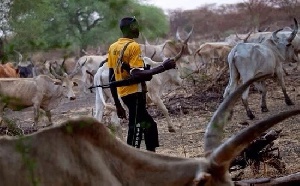Clashes between nomadic herdsmen and local farmers in Ghana has been an agelong problem, dating back as far as the era of the first Prime Minister Kwame Nkrumah, a security analyst has revealed.
According to the Dean of Academic Affairs, there is the need for government to find lasting solutions to what has become a fast-rising menace leading to the destruction of properties and loss of lives in the affected areas.
He described the current situation in the country as a peculiar one since most of the nomadic herdsmen are originally not Fulani as is usually speculated.
“…in our country it is peculiar, we have a peculiar situation where the people we call Fulani are not necessarily Fulani. We have given them a big bracket… the point is this that we could have studied what is happening around us in order to have a good answer to it” he stressed
Narrating the approach used by the first President, Dr Vladmir Antwi-Danso noted that a business barter agreement was reached by the two countries for the benefit of both parties.
“…they’ll come from Burkina Faso with their herds around November, come all the way to the Afram Plains, at that time the lake had not been formed… we didn’t have settlements so they’ll graze and graze; March, April there are rains in Burkina so they march back.
So Nkrumah signed a very good agreement with the then President of Upper Volta.. the animals don’t know boundaries, the herdsmen also don’t know boundaries, the need grass for their animals. Nkrumah signed the agreement to the effect that all animals will have to come through certain corridors on our borders. If your animals don’t pass through those corridors they can be confiscated. All of them were treated by veterinary officers and they were stamped on their skins.
But the agreement included the fact that 60 percent of the old ones who came should be sold to Ghana. That was how our tanning factory in Kumasi was built, that was how we had two shoe factories in Kumasi.”
There is an ongoing raging war between local farmers in some communities in the country and nomadic herdsmen with the latest being the razing down and destruction of over 30 houses, dozens of livestock, bags of stored food and personal belongings at Bagurugu in the Northern region. Four Fulani herders, two of them women, suffered broken body parts, resulting from severe beatings
General News of Monday, 9 September 2019
Source: www.ghanaweb.com
Fulani Clashes: How Nkrumah resolved impasse between farmers and nomadic herdsmen
Entertainment












